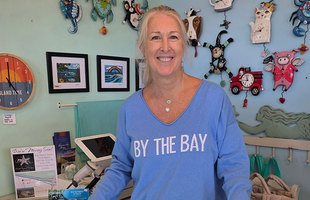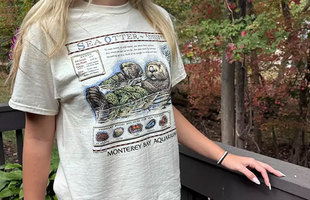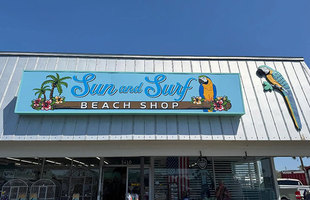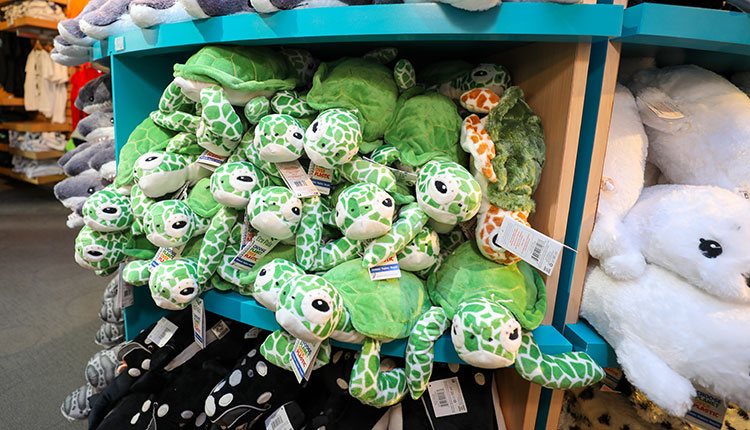
With hopes of taking environmental commitment and stewardship to the next level, the New England Aquarium in Boston, along with its retail partner Event Network, has taken steps to remove plastic from the aquarium’s gift shop.
The New England Aquarium gift shop has replaced all plastic products with those that are plastic-free, biodegradable or constructed from recycled plastic materials.
According to a press release from the New England Aquarium, the effort is part of Event Network’s Plastic S.T.O.P.S. Initiative, which the gift shop first implemented in 2023. The initiative focuses on strategizing plastic sell-through; tracking plastic items; ordering the best and newest alternative products; promoting adjacent product departments; and sharing results with transparency and integrity.
The New England Aquarium gift shop began removing plastic products from its store in 2019 when the retailer decided to remove plastic pellets from plush animals and replace those with recycled and postconsumer fill instead. That same year, the aquarium and Event Network also pushed back against the industry standard of individually bagging souvenir items in plastic for shipping.
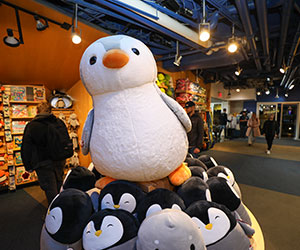
“The Plastic S.T.O.P.S. Initiative is a journey we are taking together, and we’re not at the finish line yet,” says Julie Ricci, vice president of purchasing at Event Network. “We are upfront about items that don’t currently have a viable alternative, but we all celebrate together when we can introduce a process or product that gets us closer.”
Ricci says the aquarium gift shop is not yet 100% plastic-free — apparel manufactured with polyester is one area where the Event Network team is still looking for responsible solutions.
“One of the reasons our longstanding partnership with Event Network is so successful is because we share similar institutional values, especially around sustainability,” says Suzanne Liola Matus, vice president of marketing, sales and visitor experience at the New England Aquarium. “We knew there was some financial risk involved but were mutually driven by our shared commitment to the environment as well as the challenge and reward of reaching this milestone together.”
As plastic items were phased out at the aquarium’s gift shop, replacement options that were plastic-free, biodegradable or constructed from recycled plastic materials were ordered. By January, the gift shop completed the initial plastic purge.
Although the retailer’s toy department showed a steep decrease in revenue after this change, the New England Aquarium says visitors connected with items in other departments instead, including those sourced from local vendors and artists such as Maritime Tribes, Mystic Knotworks and Beacon Designs as well as merchandise created in partnership with local Boston artist Silvia Lopez Chavez.
“I was inspired every day by the conviction and courage of our partners at the New England Aquarium,” Ricci says. “To see many of the aquarium’s revenue-driving bestsellers flagged for removal and the willingness to try going forward without them took a great deal of trust and faith that we could affect the purchasing habits of the visitors.”
According to the New England Aquarium, early results of these changes include more than 26,000 reusable bags sold in 2023 as well as more than 380,000 plastic bottles recycled to create and fill the store’s plush assortment. The aquarium also instituted a new process to address plastic abuses in the back-of-house shipping process by flagging products that arrive at the store packaged with plastic in the receiving system.
Additionally, candy and snacks are now sold in packaging that can be composted commercially or at home. The New England Aquarium says a plastic-free replacement for one of the aquarium’s former bestselling toys — the animal rescue kit — is also in the works. Products, packaging and processes have been, and will continue to be, improved to be more environmentally responsible and emphasize the commitment of the aquarium to protect the planet.
“As an ocean conservation organization, removing plastic from our operations is an expression of our mission,” says Matus. “We must model the behavior we work to inspire in our more than 1 million guests who visit us every year to protect the blue planet.”
